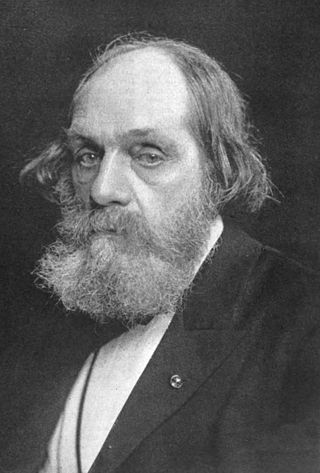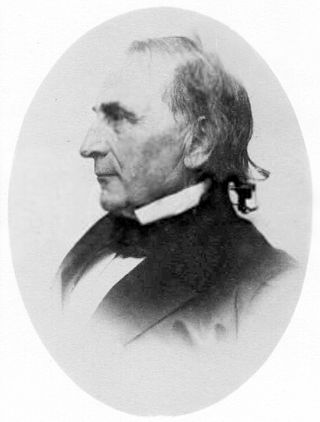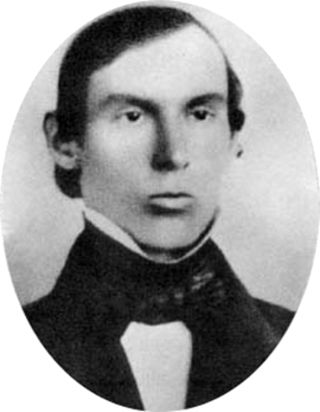Related Research Articles

Unitarianism is a nontrinitarian branch of Christianity. Unitarian Christians affirm the unitary nature of God as the singular and unique creator of the universe, believe that Jesus Christ was inspired by God in his moral teachings and that he is the savior of humankind, but he is not equal to God himself. Accordingly, Unitarians reject the Ecumenical Councils and ecumenical creeds, and sit outside traditional, mainstream Christianity.

Theodore Parker was an American transcendentalist and reforming minister of the Unitarian church. A reformer and abolitionist, his words and popular quotations would later inspire speeches by Abraham Lincoln and Martin Luther King Jr.

Edward Everett Hale was an American author, historian, and Unitarian minister, best known for his writings such as "The Man Without a Country", published in Atlantic Monthly, in support of the Union during the Civil War. He was the grand-nephew of Nathan Hale, the American spy during the Revolutionary War.

Harvard Divinity School (HDS) is one of the constituent schools of Harvard University in Cambridge, Massachusetts. The school's mission is to educate its students either in the academic study of religion or for leadership roles in religion, government, and service. It also caters to students from other Harvard schools that are interested in the former field. HDS is among a small group of university-based, non-denominational divinity schools in the United States.

Sylvester Judd was a Unitarian minister and an American novelist.

James Freeman Clarke was an American minister, theologian and author.

Andrews Norton was an American preacher and theologian. Along with William Ellery Channing, he was the leader of mainstream Unitarianism of the early and middle 19th century, and was known as the "Unitarian Pope". He was the father of writer Charles Eliot Norton.

Henry Whitney Bellows was an American clergyman, and the planner and president of the United States Sanitary Commission, the leading soldiers' aid society, during the American Civil War. Under his leadership, the USSC became the largest and most effective organization dedicated to supporting the health and efficiency of the Union army.

James Walker was a Unitarian minister, professor, and President of Harvard College from February 10, 1853, to January 26, 1860.
Jacob Frank Schulman (1927–2006) was a U.S. Unitarian Universalist minister, theologian, and author of several books. He held numerous degrees, including a B.A. from the University of Oklahoma, an S.T.B. from Harvard Divinity School, a D.Phil., M.A., and Minister Emeritus Scholar from Oxford University, and an honorary Doctorate of Divinity from Meadville Lombard Theological School.

The "Divinity School Address" is the common name for the speech Ralph Waldo Emerson gave to the graduating class of Harvard Divinity School on July 15, 1838. Its formal title is "Acquaint Thyself First Hand with Deity."

Henry Ware Jr. was an influential Unitarian theologian, early member of the faculty of Harvard Divinity School, and first president of the Harvard Musical Association. He was a mentor of Ralph Waldo Emerson when Emerson studied for the ministry in the 1820s.

Charles Chauncy was an American Congregational clergyman. He is known for his opposition to the First Great Awakening and his contributions to the development of Unitarianism and Liberal Protestantism, particularly his insistence on rational religion and defense of universal salvation.

Jones Very was an American poet, essayist, clergyman, and mystic associated with the American Transcendentalism movement. He was known as a scholar of William Shakespeare, and many of his poems were Shakespearean sonnets. He was well-known and respected among the Transcendentalists.
Unitarianism, as a Christian denominational family of churches, was first defined in Poland-Lithuania and Transylvania in the late 16th century. It was then further developed in England and America until the early 19th century, although theological ancestors are to be found as far back as the early days of Christianity. It matured and reached its classical form in the middle 19th century. Later historical development has been diverse in different countries.

Horace Holley was an American Unitarian minister and president of Transylvania University in Lexington, Kentucky.

Francis William Pitt Greenwood was a Unitarian minister of King's Chapel in Boston, Massachusetts.
Noah Worcester was a Unitarian clergyman and a seminal figure in the history of American pacifism.
Thomas Treadwell Stone was an American Unitarian pastor, abolitionist, and Transcendentalist.

Congregationalism in the United States consists of Protestant churches in the Reformed tradition that have a congregational form of church government and trace their origins mainly to Puritan settlers of colonial New England. Congregational churches in other parts of the world are often related to these in the United States due to American missionary activities.
References
- ↑ Wright, Conrad. "Introduction" to Three Prophets of Religious Liberalism: Channing, Emerson, Parker. Boston: Unitarian Universalist Association/Beacon Press, 1986: 30. ISBN 1558962867